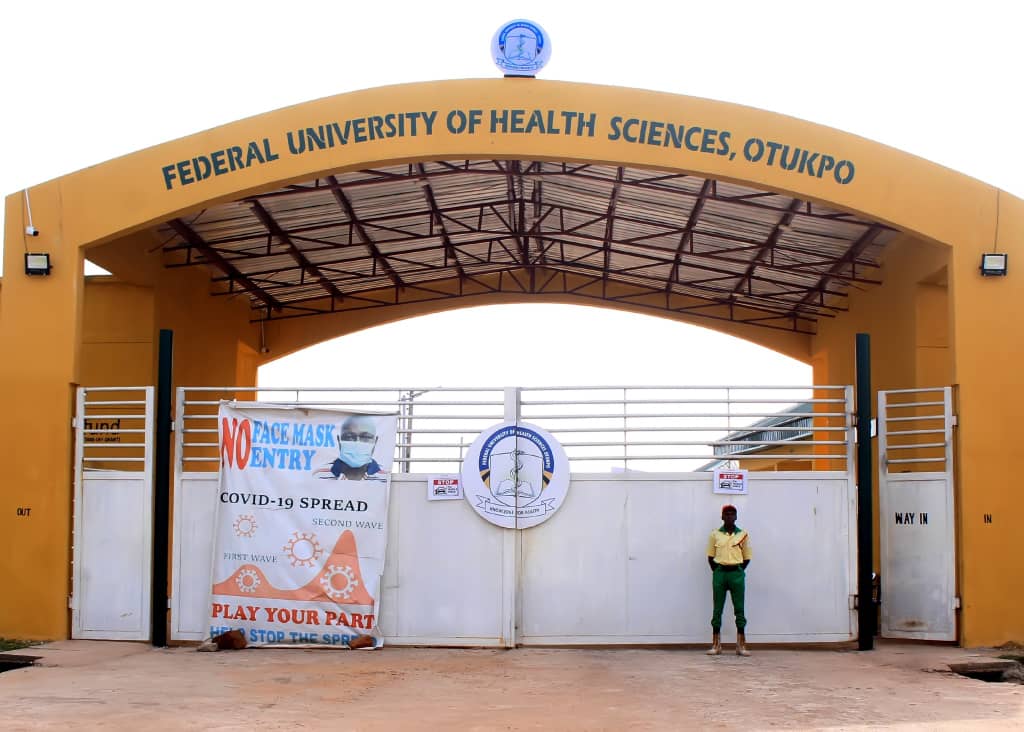News
The Battle for Integrity at FUHSO: Why Idoma Must Not Remain Silent

By Edwin Adakole.
The Federal University of Health Sciences, Otukpo (FUHSO), once hailed as a symbol of promise and progress for the Idoma people, now teeters on the edge of institutional collapse. In what should be a time of growth and development, FUHSO is instead embroiled in a crisis driven by lawlessness, disregard for protocol, and, alarmingly, silence from key figures within the Idoma community.
This ongoing crisis centers around the imposition of Prof. Ediga Agbo, who, despite not being a staff member or a Deputy Vice-Chancellor (DVC), was appointed Acting Vice-Chancellor (VC) in violation of the clear directives set forth by the National Universities Commission (NUC). This disregard for established protocols not only tarnishes FUHSO’s reputation but also erodes the foundational principles upon which the university was built.
The Disregard for NUC Protocols: A Blow to Institutional Integrity
The National Universities Commission (NUC) has mandated a clear protocol for leadership transition across Nigerian universities: when a VC’s term ends, they must hand over to the most senior Deputy Vice-Chancellor. In the case of FUHSO, Prof. Stephen Abah, an accomplished academic and bonafide son of Idoma, holds the position of DVC (Academics) and ranks highest in seniority. His appointment as Acting VC was, therefore, not only rightful but also aligned with NUC guidelines.
FUHSO is no ordinary university. It was established as a specialized institution dedicated to the health sciences—a vital part of Nigeria’s higher education landscape, and a stepping stone for Idoma’s future in medical and scientific excellence. It’s a university whose primary mandate is to produce medical professionals, and its standards must reflect that specialized purpose. Yet, in a shocking turn of events, Prof. Ediga Agbo—neither a member of FUHSO’s staff nor a qualified medical professional was imposed on the university as Acting VC.

This act was not just a violation of protocol; it was a direct affront to due process and transparency. How can an unqualified leader hope to sustain or improve an institution that is already struggling with its own growth and development?
The Ripple Effect of Negligence and Impunity
The consequences of Agbo’s leadership reach far beyond administrative challenges. Agbo’s tenure thus far has included the removal of respected faculty members from critical meetings, the seizing of official vehicles from staff without justification, and even the locking of university gates in an attempt to prevent rightful university leaders from entering. Reports indicate that police and hired thugs now roam the campus, harassing and intimidating any staff members perceived as loyal to the legitimately reinstated Vice-Chancellor, Prof. Innocent Ujah.
This hostility and lawlessness have turned FUHSO from a sanctuary of learning into a militarized zone where students and faculty alike live in fear. Campus facilities remain virtually abandoned due to the fear of violence. Every day the crisis persists, Idoma loses one more step toward self-reliance, development, and a brighter future.

Crisis in Leadership: How FUHSO’s Governing Council Threatens Its Future
Governing councils are meant to guide universities towards growth and stability, but at the Federal University of Health Sciences, Otukpo (FUHSO), the council under Engr. Ohieku Abdulsalami has brought about chaos instead.
Rather than respecting established protocols, the council appears to be running amok, blurring lines of authority and encroaching on daily operations in ways that threaten FUHSO’s core mission and integrity.
This overreach has manifested in decisions that defy both protocol and law. The appointment of Prof. Ediga Agbo as Acting Vice-Chancellor, despite him not being a staff member or the institution’s most senior Deputy Vice-Chancellor, starkly violates National Universities Commission (NUC) protocols, which require an outgoing VC to hand over to the most senior DVC. At FUHSO, this is Prof. Stephen Abah, DVC (Academics), who was rightfully elected by the university senate. Yet the council bypassed him, imposing Agbo and creating a leadership crisis that has sparked tension and disrupted campus life.
The effects of this turmoil are undeniable. Faculty and students operate under fear of reprisal, classrooms stand empty, and security forces now patrol a campus once dedicated to research and teaching. FUHSO’s mission—to advance health sciences and serve as a beacon for Idoma and the nation—is jeopardized by this instability. The governing council’s actions are not merely administrative missteps; they are active threats to the institution’s future.
It’s time for accountability. The FUHSO governing council must answer for these disruptive actions, which risk not only the university’s reputation but its very ability to function. Silence from community leaders and stakeholders is no longer an option. FUHSO’s future depends on a return to order, respect for university governance, and a commitment to its foundational mission. Anything less risks destroying what this university stands for.
The Targeted Attacks on Prof. Stephen Abah: A Tribal Undercurrent
Prof. Stephen Abah’s character and qualifications make him a natural leader for FUHSO, an institution that serves as a beacon for the Idoma people. Yet, his ascension to Acting VC has made him a target. It’s been noted that Prof. Abah, an “Enone”—a sub-clan within Idoma—faces attacks from those who deem leadership within FUHSO the exclusive domain of “Enochi.” The caste-driven conflict is preventing an Idoma institution from fostering unity and excellence, damaging the credibility of a university that should be a pillar for all Idoma, not a select few.
Agbo’s appointment and the ensuing attacks on Prof. Abah represent more than just a leadership crisis; they signify a perilous tribal and political power struggle. This struggle, bolstered by a wealthy “Enochi” financier, has fostered an environment in which due process is subverted, unity is eroded, and impunity reigns.
The Dire Consequences of Silent Complicity
This unchecked lawlessness poses severe consequences for FUHSO, the Idoma people, and Nigeria’s higher education landscape. Without urgent action to restore order, FUHSO will be unable to fulfill its mission as a specialized health sciences institution.
Here’s what Idoma stands to lose:
1. Credibility in Health Sciences Education:
Allowing an unqualified Acting VC to lead FUHSO risks diluting the university’s focus on health sciences, hindering its ability to attract qualified staff and deliver top-tier education.
2. Threat to Students and Staff Safety:
The administration’s use of thugs and police to intimidate those supporting Prof. Abah has created a climate of fear on campus. Reports of harassment, gate lockouts, and confrontations have left the campus desolate, disrupting academic activities and posing a threat to students and faculty alike.
3. Erosion of Idoma’s Legacy:
FUHSO was built to serve as a lasting legacy for the Idoma people—a source of pride and a pathway for the next generation of medical and scientific professionals. Failure to uphold due process and unity erodes this legacy, reducing FUHSO to a mere pawn in personal and political agendas.
4. Stifling of Idoma’s Growth and Unity:
Silence from Idoma’s leaders in the face of such blatant injustice does more than allow chaos to continue; it implies acceptance. This crisis represents a critical moment for Idoma leadership, a chance to assert the value of integrity, unity, and excellence over division and impunity.
A Call for Accountability: Idoma’s Leaders Must Speak Up
The current trajectory of FUHSO’s administration, enabled by silence from within Idoma, puts the institution’s survival at risk. Idoma leaders—cultural, political, and community figures alike—must rise to the occasion. By remaining silent, they tacitly allow FUHSO’s future to be dictated by outsiders and undermine the very institution built to empower their youth.
The law, the NUC’s mandate, and the will of the FUHSO community unequivocally recognize Prof. Stephen Abah as the legitimate Acting VC. Agbo’s imposition, lacking any legal or ethical grounding, must be contested by all who value the rule of law.
This crisis is a defining moment for FUHSO and for Idoma itself. Will its leaders defend the principles of unity and integrity, or will they allow the erosion of a vital educational institution? Silence is not neutrality; it is complicity in the destruction of an institution that could empower generations.
(Adakole, President of Idoma Integrity Network, writes from Otukpo)
News
TETFUND threatens to cut financial support to non-performing institutions

The Tertiary Education Trust Fund (TETFUND) has threatened to cut financial support to beneficiary tertiary institutions that fail to meet performance benchmarks or mismanage allocated funds.
The agency said it would de-list such tertiary institutions from its support programmes.
Executive Secretary of TETFUND, Sonny Echono gave the warning at a one-day strategic engagement with heads of institutions, bursars, and heads of procurement of the agency’s beneficiary institutions in Abuja on Monday.
Echono said the policy was not meant to punish, but rather safeguard the credibility and impact of TETFUND interventions.
He said: “Let me be clear, institutions that consistently fail to access, utilise or retire funds appropriately, or that fall short of enrollment and academic performance thresholds, risk being delisted as TETFUND beneficiary institutions.”
He also disclosed the intention of TETFUND to ensure that its resources were directed towards institutions that were committed to high standards of governance, transparency, and accountability.
Echono said the strategic engagement was targeted at addressing recurring challenges in Nigeria’s tertiary education sector, improving project execution, and enhancing the quality of education.
A key focus, he said, was the Academic Staff Training and Development (AST&D) intervention.
He said due to rising costs and incidents of scholars absconding, the foreign component of the TETFUND Scholarship for Academic Staff (TSAS) was suspended as of January 1, 2025 with emphasis now shifted to cost-effective, locally driven training.
Echono said this year’s intervention budget prioritises consolidation, sustainability, and the completion of abandoned projects.
He added: “This engagement is not merely a meeting but a strategic convergence. It is designed to address recurring issues of concern, streamline project implementation, and enhance the overall quality of tertiary education delivery in our nation.
“As we move forward, let us approach today’s discussions with openness, collaboration, and a shared vision to elevate our institutions and the students we serve.
“Together, we can strengthen accountability, drive innovation, and ensure that the legacy of TETFUND remains impactful, equitable and enduring for generations to come.”
Executive Secretary of the National Universities Commission (NUC), Professor Abdullahi Ribadu emphasised the importance of the meeting for evaluating the implementation and impact of TETFUND – supported projects in higher education institutions.
The NUC chief, who was represented by Dr. Joshua Atah appreciated TETFUND’s vital role in improving infrastructure, research, staff development, and academic quality, stating that without its support, public education would struggle to survive.
Prof. Ribadu acknowledged the adaptability of TETFUND’s policies, such as suspending international scholarships to reallocate resources more effectively.
He urged tertiary institutions to be more responsive and ensure that interventions were relevant and efficiently executed.
Ribadu encouraged judicious and timely use of funds and called for open and constructive dialogue during the engagement.
“This calls for greater responsiveness also on the part of the institutions. This responsiveness also includes the areas of the design and implementation of these interventions to ensure that they remain relevant, impactful, and aligned with the future of education in Nigeria.
“It’s also important that we judiciously utilise these resources, and not just judicious utilisation but also in a timely manner so that we don’t lose the fund,” he said.
News
Again, Boko Haram reportedly attack military base in Borno

Suspected Boko Haram terrorists have attacked a Nigerian Army base in Marte , the headquarters of Marte Local Government Area of Borno State with casualties
The terrorists attacked the 153 Task Force Battalion’s Forward Operation Base (FOab) at around 3am on Monday, according to the locals and security sources.
They said the terrorists also burnt armoured tanks and seized arms and ammunition from the base during the attack.
“ISWAP has taken over Marte. An unspecified number of soldiers were killed, some captured, and many others fled towards Dikwa.
“They are currently at the 24 Task Force Brigade in Dikwa,” a source said.
Recent terrorist attacks have targeted several military formations in Borno and Yobe, including Sabon Gari and Buni Yadi, with the latest being the attack on the 153 Task Force Battalion.
Attempts to reach Maj-Gen Markus Kangye, Director of Defence Media Operations, were unsuccessful as he didn’t answer calls or respond to text messages.
News
Taraba Woos Global Investors Ahead of Landmark Economic Summit

…Taravest 2025 to Unlock Opportunities in agric, energy, mining
…as state offers peace, resources, incentives
By Gloria Ikibah
The Federal Government and Government of Taraba State have called on the international community and private sector players to partner with Taraba in unlocking the state’s massive investment potentials across agriculture, energy, mining, and tourism.
This call comes ahead of the Taraba International Investment Summit (Taravest), with the theme: “Unlocking Taraba’s Investment Potentials, Advancing Agriculture, Energy, Mining and Industrialization for sustainable development “, scheduled for May 21, 2025, in Jalingo, Taraba state.
Speaking at the diplomatic preparatory briefing in Abuja, the Minister of Foreign Affairs, Ambassador Yusuf Maitama Tuggar, who was represented by Ambassador Anderson Madubike commended the initiative, describing it as a platform that aligns with Nigeria’s economic diplomacy agenda.

“I wish to commend His Excellency and indeed the Government of Taraba State for convening this timely summit, particularly at this time when the whole world is in need of creating a travelling investment climate through co-location. There is therefore the need for partnership between governments, private sector players, and civil societies,” the Minister stated.
He emphasised that Taravest represents “a collective pursuit of development and prosperity, not only for Taraba State, but indeed for the whole world.
“They have enormous resources—we’re talking about gold, we’re talking about uranium, and many others, and of course agriculture, fertile land, which you know, food, is the way to go”, he added.
Ambassador Madubike noted that the theme for the summit, themed “Unlocking Taraba’s Investment Potentials: Advancing Agriculture, Energy, Mining, and Industrialization for Sustainable Growth,” is expected to attract both local and international stakeholders.
“Our presence here signifies a commitment to making Taraba a model of investment and sustainable development,” he said.
In his address, the Executive Governor of Taraba State, Dr. Agbu Kefas, expressed gratitude to the Federal Ministry of Foreign Affairs and extended an open invitation to diplomats and investors.
Dr. Agbu highlighted the significance of the summit as the first of its kind since the state was created in 1991, and laid out three clear objectives.
“It is my great honor to welcome you to the Paivota Preparatory Meeting for the Taraba State International Investment Summit, Taravest 2025, in just nine days to come.
“To orient you to Taraba’s untapped potentials and the structure of the summit; to inspire your confidence in our security, infrastructure, and business environment; and to enlist your support in rallying investors, technical partners, and development agencies”, the governor said.
He emphasised Taraba’s strategic strengths, citing five core advantages, this is as he reassured guests about the state’s security readiness.

“Peace and security, over 44,000 km² of fertile land for agriculture, massive hydropower and solar capacity, rich mineral reserves including gold, barite, and lithium, and growing opportunities in tourism and the digital economy.
“I want to assure you that we have coordinated with the state security services, the Nigerian military, the Nigerian police, and our traditional rulers… to guarantee your safety”, he added.
The summit, he explained, will feature B2B and B2G matchmaking, policy dialogues, PPP frameworks, and guided site visits to model farms and mining zones.
“Taravest 2025 is more than a conference. It is a statement of fact that Taraba is open for transformative partnership. I invite you to leverage your good offices to mobilize your government and business communities,so that together we will convert promise into progress and unlock a future of shared prosperity”, Dr. Agbu added.
He also urged embassies to submit the names of participating investors and delegates by May 16, 2025, to ease logistics.
Taravest 2025, which will hold at the Banquet Hall of the Government House in Jalingo, aims to attract capital, expertise, and innovation to transform Taraba into a thriving investment destination and economic powerhouse.
-

 News23 hours ago
News23 hours agoJust in: Wike admits Fubara alongside 2 govs visited him on reconciliatory moves
-

 News20 hours ago
News20 hours agoGo home to face corruption probe, protesters in London tell Kyari (Photos)
-

 News23 hours ago
News23 hours agoAMCON, Others Dragged to Court Over Alleged Undervalued Sale of Ibadan Disco for $62m
-

 News7 hours ago
News7 hours ago2nd Anniversary: Tinubu to commission Abuja International Conference Centre – Wike
-

 News7 hours ago
News7 hours agoUS revokes governor’s visa
-

 News16 hours ago
News16 hours agoUK unions slam Govt’s decision to end care worker visas
-

 News23 hours ago
News23 hours agoAfter quarter of a century, NDLEA gets forensic labs in Abuja, Enugu, trains 20 officers+Photos
-

 News15 hours ago
News15 hours agoSAD! Woman, child electrocuted in Edo






